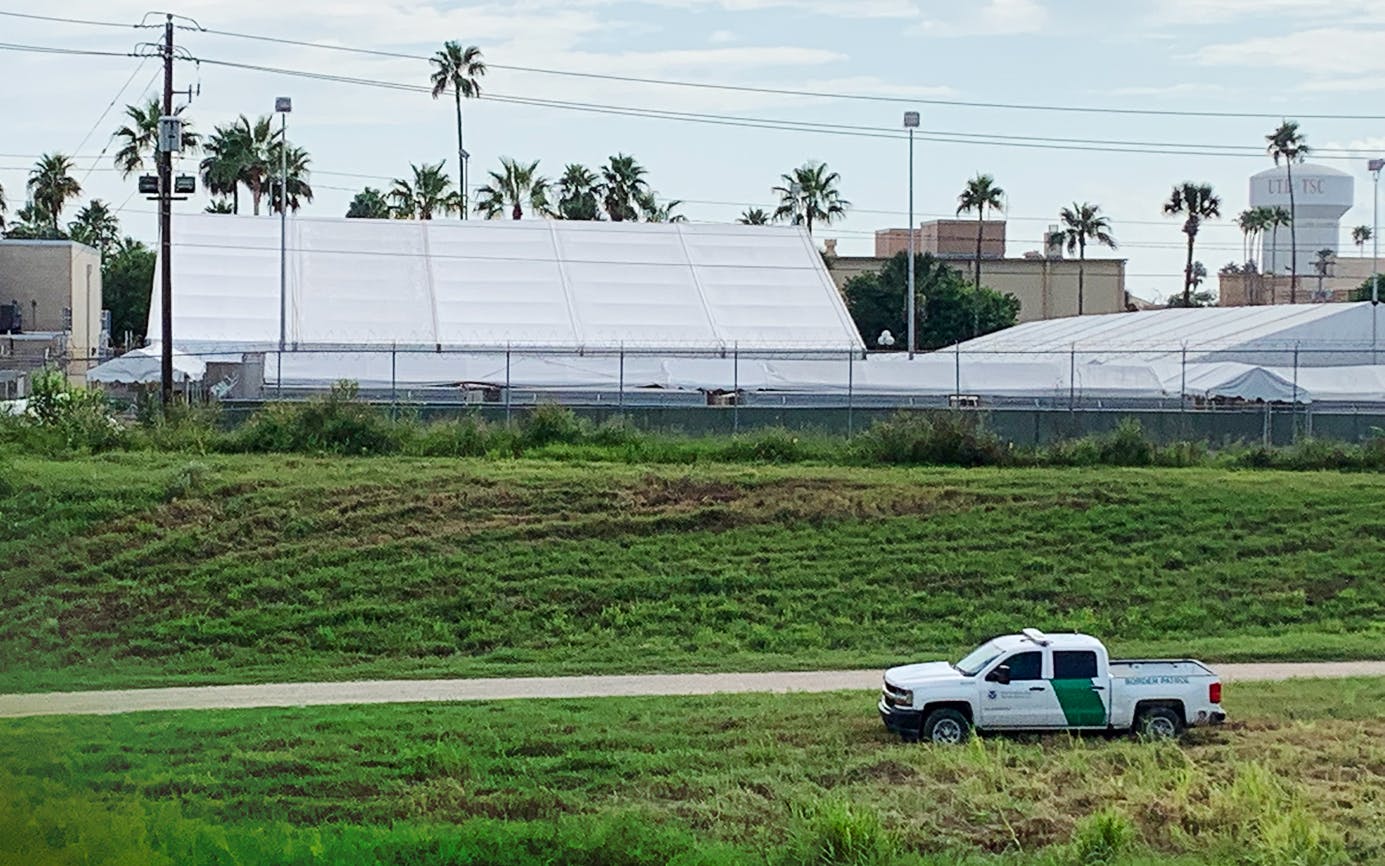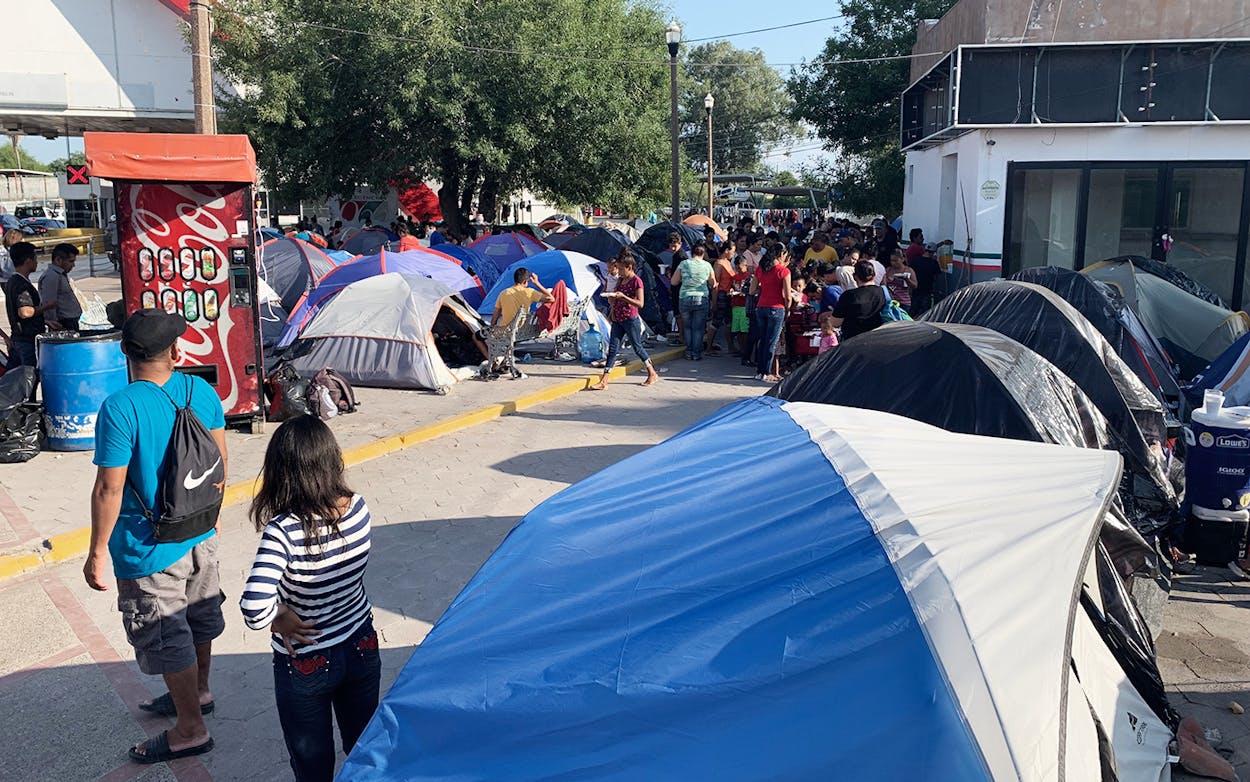At their first court appearance in the United States, the Zavaletas—a family of three from Guatemala—had a simple request for immigration judge Daniel Gilbert. “Is there any way we could stay in this country so we can hire a lawyer?” asked Eric Zavaleta, the father. “Over there [in Mexico], we’re living on the streets and can’t find one.”
Gilbert paused after listening to the impassioned plea and then said, “I don’t have the authority to grant that request.”
The exchange underscored the dilemma facing migrants stuck in Matamoros under the Trump administration’s widening Migrant Protection Protocols (MPP), which require asylum seekers to wait in Mexico while their claims are heard. It also highlighted the lack of latitude granted immigration judges, who are struggling to ensure basic standards of justice.
In Gilbert’s Harlingen courtroom on Monday, I watched as the judge heard two of the first cases for asylum seekers subject to MPP in the Rio Grande Valley. The two families—six people in all—offered testimony via closed-circuit TV from tents at the Brownsville Port of Entry. Reporters, attorneys, and members of the public have been barred from observing the proceedings from the tent courtrooms. (Officials with Amnesty International, spurred by a Texas Monthly article, visited Laredo on Monday and also were denied access to the tents there.)
What I saw was a judge patiently trying to explain the complicated nuances of immigration law to migrants who had no legal counsel and appeared baffled by the proceedings.
Gilbert methodically explained the migrants’ rights, appearing to read off a checklist. He explained that they would have to find their attorneys and went over how the families could introduce evidence to bolster their asylum claims. The Zavaletas sat at a table in front of the camera listening patiently. Their son, Emerson, who will turn one on Thursday, was fussy and crying. The mother, Erica, tried unsuccessfully to soothe him by nursing him.
“I don’t understand,” said Cindy Lopez through an interpreter when asked if she cared to pursue alternatives to asylum to stay in the United States. The 29-year-old Guatemalan woman appeared with her eight-year-old son, Chris, and twelve-year-old daughter, Monica.
The judge told both families that he could set a new court date to allow them time to find a lawyer, but both declined the offer. I couldn’t help but speculate why. I have been to Matamoros twice this month, visiting the estimated six hundred people living in tents on the street at the base of an international bridge waiting for their MPP cases to advance. Many traveled for months to get to the United States and then were given court dates two months away. Meanwhile, they’re stuck in a squalid state of limbo. The Zavaletas first crossed into Hidalgo, near McAllen, on August 9; they’ve been living at the Matamoros camp for 38 days before this hearing. I wouldn’t want to further delay the proceedings either.

The air in the Matamoros tent camp is hot, still, and heavy with the smell of human waste. One man, Jose Escobar, 24, of Honduras, explained to me how the people spent their days chasing the shade. In the morning, the shade is near their tents; later in the day, when the sun is higher, most of the people move to a grove of trees that offers some respite from the sun. Protecting themselves from the stifling heat is their main concern—not seeking the legal help they need.
At night, the migrants sleep in shifts in their makeshift tent city to stand watch, making sure the children don’t leave the tents and become prey for kidnappers.
The contrast between the legal requirements for staying in the United States and the reality of these migrants’ circumstances is stark. To apply for asylum, the judge tells the Zavaletas they must fill out a twelve-page document by answering detailed questions, in English, about their claims. To have a shot at asylum, they need supporting documents, such as newspaper stories, police reports, and hospital records. Of course, all those materials must be translated into English by a certified translator.
After the forms are filled out, they must bring two copies of all documents to court. U.S. lawyers who are trying to help these immigrants say such requirements are virtually impossible without the help of legal aid. But when a group of lawyers recently arrived at the Matamoros tent city to inform the migrants of their rights, Escobar made no move to go listen to them. I asked why, and he responded that he had no money. When I told him they were not seeking money, he seemed skeptical; in an area that charges four pesos for migrants to use a bathroom, everybody wants money. Of course, no copiers for the court documents were in sight.
“These people are not lawyers. They really need a lawyer to guide them,” said Erin Thorn Vela, an attorney with the Texas Civil Rights Project who is trying to provide the help.
At least 11,000 migrants are now part of MPP, according to the Transactional Records Access Clearinghouse or TRAC, an immigration data gathering project based at Syracuse University. About 1,500 are believed to be in the Brownsville/Matamoros area.
At the end of the Zavaletas’ hearing, Gilbert set another hearing for the family, on October 16—another month of waiting. That’s when Eric Zavaleta asked to stay. His request denied, the family could be seen on the TV screen leaving the tent to return to Matamoros.
- More About:
- Brownsville






